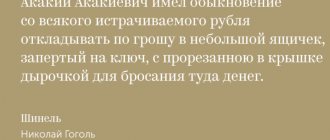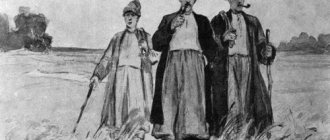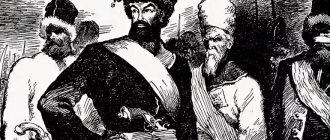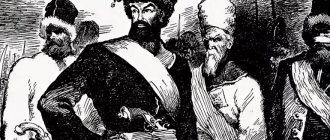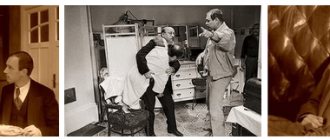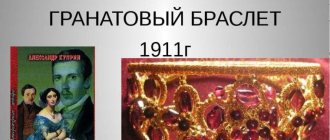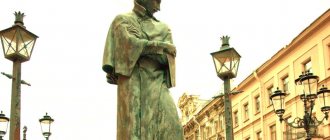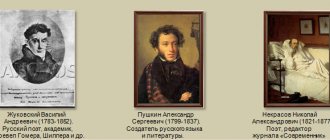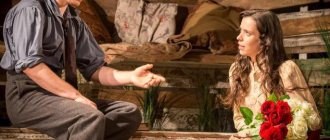“one sideways left-hander, there is a birthmark on his cheek, and the hair on his temples was torn out during training”
***
“I worked smaller than these horseshoes: I forged the nails with which the horseshoes are hammered - but no small scope can take it”
***
In modern realities, Lefty and his colleagues would be called real workaholics:
***
The author calls one of the main features of Lefty and his colleagues the cunning of the mind, in which they cannot be surpassed even by courtiers:
***
“The Tula people were not inferior to him in cunning, because they immediately had such a plan that they did not even hope that Platov would believe them.”
***
“So Platov wiggles his mind, and so do the Tula people. Platov wiggled and wiggled, but saw that he couldn’t outweigh Tula.”
***
Despite his skill and celebrity, Lefty belongs to the poor:
***
“We are poor people and due to our poverty we do not have a small scope, but our eyes are so focused.”
***
“My little brother is already an old man, and my mother is an old woman and is used to going to church at her parish.”
***
“Our science is simple: according to the Psalter and the Half-Dream Book, but we don’t know arithmetic at all”
***
The costs of religious education explain his readiness for forgiveness, which is why he so easily accepts Platov’s unfair beatings:
***
- Leskov, however, also endowed Lefty with self-esteem, courage and determination:
***
“I want to go to my native place as soon as possible, because otherwise I might get a form of insanity”
***
The main character of "Skaz" is susceptible to a typical Russian disease - heavy drinking:
***
“Tell the sovereign that the British don’t clean their guns with bricks: let them not clean ours either, otherwise, God forbid war, they’re not good for shooting.”
***
- Concluding the story, the author speaks of the brilliant Lefty, forgotten and abandoned to the mercy of fate as unnecessary:
***
“Such masters as the fabulous Lefty, of course, are no longer in Tula: machines have equalized the inequality of talents and talents”
“Platov did not answer the sovereign, he just lowered his hornbeam nose into a shaggy cloak.”
***
“Platov wanted to take the key, but his fingers were stubby: he caught and caught, but could not grab it.”
***
At the time of the story, Platov accompanies Alexander I on European trips:
***
“Emperor Alexander Pavlovich graduated from the Vienna Council, then he wanted to travel around Europe with him was the Don Cossack Platov”
***
- In addition, the brilliant military man is rather uneducated; from the point of view of the same courtiers, for example, he does not know and does not want to know foreign languages:
***
However, a Cossack cannot be considered ignorant, since his reluctance to learn languages is explained by his conviction that Russians do not need it:
***
He does not at all consider education useless; moreover, he considers it necessary for Russian masters:
***
“Platov will now say: so and so, and we have our own at home just as well,” and he’ll give something away.”
***
“The Emperor is happy about all this, everything seems very good to him, but Platov maintains his expectation that everything means nothing to him.”
***
- “and Platov took the small scope and, without saying anything, put it in his pocket, because “it belongs here,” he says, “and you already took a lot of money from us.”
***
The author endowed the character with many traits characteristic of a Russian person. He is cunning:
***
He doesn’t like it when artificial difficulties are created, but he can sincerely sympathize:
***
He also always drives at maximum speed, and does not spare either people or animals:
***
“And if any Cossack dozes off, Platov himself will poke him from the stroller with his foot, and they will rush even angrier.”
***
- If it seems to him that the matter is being deliberately delayed, he becomes openly cruel:
***
“It’s in vain that you offend us like that; we, as the sovereign’s ambassador, must endure all insults from you.”
***
“How, they say, are you taking him away from us without any tugment? it will not be possible to follow him back! And instead of answering Platov showed them his fist.”
***
“and in this reasoning, he got up twice, crossed himself and drank vodka, until he forced himself into a deep sleep”
***
“I’ve already completely served my time and received full publicity - now they don’t respect me anymore”
***
- Interesting fact. The prototype of Platov - the real Count Platov died under Alexander I, until his death he commanded the Don Cossack army.
Emperor Alexander I, at the time of the story, is traveling around Europe and gives the impression of an “affectionate” sovereign to his foreign surroundings:
***
“everywhere, through his affectionateness, he always had the most internecine conversations with all sorts of people”
***
“The British came up with various tricks to captivate him with his foreignness and distract him from the Russians, and in many cases they achieved this.”
***
“The British immediately began to show various surprises and explain what was what. The Emperor rejoices at all this, everything seems very good to him.”
***
The Emperor is very generous, but at the same time he is no less weak-willed. For the fact that the British “give” him a steel flea, he pays them a huge sum:
***
“The Emperor immediately ordered the British to give a million, whatever money they wanted - they wanted it in silver coins, they wanted it in small banknotes.”
***
“Please leave it alone, it’s none of your business - don’t spoil politics for me. They have their own custom"
***
Suppressed by the superiority of the British, he does not want to believe in Russian skill at all:
***
“You will no longer argue that we Russians are worthless with our significance.”
***
Despite Platov’s courage, proving to him that it’s all about education and proper organization, Alexander does not take his objections seriously:
***
Moreover, the sovereign (Napoleon’s winner) in Leskov’s description is so spineless and sensitive that even military affairs put him into depression, from which he eventually dies:
***
“The sovereign became melancholy from military affairs and he wanted to have a spiritual confession in Taganrog with priest Fedot.”
“Emperor Nikolai Pavlovich, at first, also did not pay any attention to the flea, because there was confusion when he rose.”
***
“It’s you, courageous old man, who speaks well, and I entrust you to believe this matter.”
***
The basis of the confrontation between Nikolai and foreign masters, first of all, is his own pride:
***
To no lesser extent, the author endowed the sovereign with self-confidence. He doesn’t even admit that he could be deceived:
***
“Give it here. I know that my friends cannot deceive me. Something has been done here beyond the pale."
***
“You see, I knew better than anyone that my Russians would not deceive me. Look, please: they, the scoundrels, shoed the English flea into horseshoes!”
Lefty
The main character of the story is a person with physical characteristics:
“...Tula braid Lefty...”
“Why does he cross himself with his left hand? <…>
“He is left-handed and does everything with his left hand.”
“... one left-handed man with a sideways eye, a birthmark on his cheek, and the hair on his temples torn out during training.”
He is a gunsmith by profession, one of the three most famous craftsmen in Russia specializing in metal weapons, who, however, can fulfill any order, even the most unusual:
“Tula people are smart and knowledgeable in metal work...”
“...weaponsmiths are three people, the most skilled of them, one is left-handed with a scythe...”
“...three masters do not refuse any demand...”
“Tula masters who did amazing work...”
The left-handed person is entrusted with the most delicate work:
“...you can hear thin hammers hitting ringing anvils”
“...I worked smaller than these horseshoes: I forged the nails with which the horseshoes are hammered - no small scope can take them there anymore.”
In modern realities, Lefty and his colleagues would be called real workaholics:
“...All three of them came together in one house with Lefty, they locked the doors, closed the shutters in the windows. <…> They sit for a day, two, three and don’t go anywhere, they’re all tapping with hammers. They are forging something, but what they are forging is unknown.”
The author calls one of the main features of Lefty and his colleagues the cunning of the mind, in which they cannot be surpassed even by courtiers:
“...the Tula people were not inferior to him in cunning, because they immediately had such a plan that they did not even hope that Platov would believe them...”
“So Platov wiggles his mind, and so do the Tula people. Platov wiggled and wiggled, but he saw that he couldn’t outweigh Tula..."
“...nothing could stop these cunning masters...”
Despite his skill and celebrity, Lefty belongs to the poor:
“We are poor people and due to our poverty we do not have a small scope, but our eyes are so focused.”
He lives in a small house with his old parents:
“...yes, the entire roof was torn off the small house at once...”
“...I have,” he says, “my parents at home.”
“...my little brother is already an old man, and my mother is an old woman and is used to going to church in her parish...”
Lefty is not married:
“...I’m still single”
The main character dresses modestly:
“He’s walking in what he was wearing: in shorts, one pant leg is in a boot, the other is dangling, and the collar is old, the hooks don’t fasten, they’re lost, and the collar is torn; but it’s okay, don’t be embarrassed”
It’s hard to call him truly literate:
“Our science is simple: according to the Psalter and the Half-Dream Book, but we don’t know arithmetic at all”
Like his fellow countrymen, Lefty, who received such an “education,” is a believer who begins any task only after receiving a blessing from above through prayer:
“Tula people... are also known as the first experts in religion”
“Tulyak is full of church piety and a great practitioner of this matter...”
“...we must take it after thought and with God’s blessing”
“We ourselves don’t yet know what we will do, but we will only hope in God...”
“...our Russian faith is the most correct...”
The costs of religious education explain his readiness for forgiveness, which is why he so easily accepts Platov’s unfair beatings:
- Forgive me, brother, for tearing your hair off. <…>
“God will forgive.” This is not the first time that such snow has fallen on our heads.
Leskov, however, also endowed Lefty with self-esteem, courage and determination:
“And Lefty replies: “Well, I’ll go like that and answer.”
“...and the collar is torn; but it’s okay, don’t be embarrassed”
Lefty’s devotion to his homeland is also worthy of respect:
“...we are not good at science, but we are loyal to our fatherland”
“...I want to go to my native place as soon as possible, because otherwise I might get a form of insanity”
“There was nothing the British could do to tempt him so that he would be seduced by their lives...”
The main character of "Skaz" is susceptible to a typical Russian disease - heavy drinking:
“I understand this disease, but the Germans cannot treat it...”
However, even dying in poverty and oblivion, Lefty does not think about himself, but about how to finally benefit the fatherland, trying to convey to the king the overseas secret that guns should not be cleaned with bricks:
“Tell the sovereign that the British don’t clean their guns with bricks: let them not clean ours either, otherwise, God forbid war, they’re not good for shooting.”
“And with this fidelity, Lefty crossed himself and died.”
Concluding the story, the author speaks of the brilliant Lefty, forgotten and abandoned to the mercy of fate as unnecessary:
“Such masters as the fabulous Lefty, of course, are no longer in Tula: machines have equalized the inequality of talents and talents...”
Chapter 16
- Proverb: “Decently, nobly, as it should.”
Quote from the work: “...When the holiday comes, they will gather in pairs, take a stick in their hands and go for a walk in a decorous and noble manner, as they should.”
- Proverb: “Whoever drinks too much will get the better of him.”
Quote from the work: “...So that you don’t drink anything alone, but drink everything in equal parts: what one person does, the other will certainly do the same, and whoever outdrinks someone will get the same.”
- Proverb: “The sky is cloudy, the belly is heaving - the boredom is great, and the road is long.”
Quote from the work: “...A left-hander thinks: the sky is cloudy, the belly is heaving, - there is great boredom, and the road is long...”.
Platov
Cossack, originally from the Don, participant in the War of 1812, in which he earned awards:
“...my Don people? Well done, they fought without all this and drove away twelve tongues”
“...now he got up from the couch, hung up the phone and appeared to the sovereign in all orders”
“Platov stood up, put on his medals and went to the sovereign...”
The appearance is remarkable - a “prominent” nose and mustache:
“Platov did not answer the sovereign, he just lowered his hornbeam nose into a shaggy cloak...”
“...and he walks <...> only making rings from his mustache”
Special features: wounded hands:
“Platov wanted to take the key, but his fingers were stubby: he caught and caught, but he just couldn’t grab it...”
“...showed a fist - so terrible, purple and all chopped up, somehow knitted together...”
At the time of the story, Platov accompanies Alexander I on European trips:
“... Emperor Alexander Pavlovich graduated from the Vienna Council, then he wanted to travel around Europe... <...> with him was the Don Cossack Platov...”
The character is distinguished by his courage, which is recognized by those around him:
“What do you, courageous old man, want from me?”
“It’s you, courageous old man, who speaks well...”
The courtiers don't like him too much:
“And the courtiers <...> they couldn’t stand him for his bravery”
In addition, the brilliant military man is rather uneducated; from the point of view of the same courtiers, for example, he does not know and does not want to know foreign languages:
“...especially in large meetings, where Platov could not speak French completely...”
However, a Cossack cannot be considered ignorant, since his reluctance to learn languages is explained by his conviction that Russians do not need it:
“...and considered all French conversations to be trifles that are not worth the imagination”
He does not at all consider education useless; moreover, he considers it necessary for Russian masters:
“... the sovereign thought that the British had no equal in art, and Platov argued that ours, no matter what they look at, can do anything, but only they have no useful teaching. And he presented to the sovereign that the English masters have completely different rules of life, science and food...”
The courtier is convinced that Russian cannot be worse than foreign:
“...Platov will now say: so and so, and we have our own at home just as well, and he’ll give something away...”
“The Emperor is happy about all this, everything seems very good to him, but Platov maintains his expectation that everything means nothing to him.”
He can even steal if he thinks it will be useful for Russia:
“...and Platov <...> took the small scope and, without saying anything, put it in his pocket, because “it belongs here,” he says, “and you already took a lot of money from us.”
The author endowed the character with many traits characteristic of a Russian person. He is cunning:
“He asked them this way and that and spoke to them slyly in all manners in the Don manner; but the Tula people were not inferior to him in cunning... <...> So Platov wiggles his mind, and the Tula people too. Platov wiggled and wiggled, but he saw that he couldn’t outweigh Tula..."
He doesn’t like it when artificial difficulties are created, but he can sincerely sympathize:
“You’d better go to the Cossack Platov - he has simple feelings”
Can't stand waiting:
“...and he’s gritting his teeth—it’s still a while before everything shows up to him. So at that time everything was required very accurately and quickly, so that not a single minute was wasted for Russian usefulness.”
He also always drives at maximum speed, and does not spare either people or animals:
“Platov rode very hastily and with ceremony: he himself sat in a carriage, and on the box two whistling Cossacks with whips on both sides of the driver sat down and so they watered him without mercy so that he could gallop.”
“And if any Cossack dozes off, Platov himself will poke him from the stroller with his foot, and they will rush even angrier.”
If it seems to him that the matter is being deliberately delayed, he becomes openly cruel:
“He will eat us alive until that hour and will not leave our souls untouched.”
Can easily offend forced people:
“It’s in vain that you offend us like that; we, as the sovereign’s ambassador, must endure all insults from you...”
“... how, they say, are you taking him away from us without any tugment? it will not be possible to follow him back! And instead of answering Platov showed them his fist..."
At the same time, he is religious:
“...he cracked a good glass and prayed to God on the road fold...”
“...and in this reasoning he got up twice, crossed himself and drank vodka until he forced himself into a deep sleep”
Platov is not a cardboard character at all. Despite all his declared courage at the beginning of the story, he is quite experienced in court rules, knows very well the tough temper of Nicholas I and not only does not get into trouble unnecessarily, but is even openly afraid of the new sovereign:
“...I don’t dare argue and must remain silent”
“Platov was afraid to show himself to the sovereign, because Nikolai Pavlovich was terribly wonderful and memorable.. <...> And at least he was not afraid of any enemy in the world, but then he chickened out...”
At the end of the story he laments that:
“...I’ve already completely served my time and received full poppletion - now they don’t respect me anymore...”
Interesting fact. The prototype of Platov - the real Count Platov died under Alexander I, until his death he commanded the Don Cossack army.
Chapter 15
- Proverb, stable expression: “everything turned upside down inside”
Quote from the work: “...at each station the belts were already tightened by one badge; so that the intestines and lungs do not get confused.”
The expression used in the tale “so that the intestines and lungs do not get confused” is very close in meaning to the saying (or stable expression) “everything turned upside down inside.” They often say: “Everything turned upside down inside me.”
- Proverb: “And in Poland there is no longer a master.”
One hundred percent proverb. In the collection “V. I. Dahl “Proverbs of the Russian People”, it is placed in two sections: “YARD - HOUSE - FARM” and “FAMILY - RELATIVES”.
In England, Lefty is treated to various dishes and wine, they offer the first to drink, to which he replies: “... No,” he says, “this is not the order: and in Poland there is no longer a master, - eat it yourself in advance.” The meaning of the proverb is that Lefty did not violate the old order: the owner is in charge, he gets to drink first.
- Proverb: “A sapazhu monkey is a velvet thong.”
Quote from the work: “A corduroy shawl is just like a sapazhu monkey.”
The statement was most likely created by Leskov himself. In the work, Lefty characterizes English ladies with this expression, thereby ridiculing their manner of dressing.
Alexander I
Emperor Alexander I, at the time of the story, is traveling around Europe and gives the impression of an “affectionate” sovereign to his foreign surroundings:
“...everywhere, through his affectionateness, he always had the most internecine conversations with all sorts of people...”
The Tsar is greedy for everything interesting, especially if it is of foreign origin:
“The British... came up with various tricks in order to captivate him with his foreignness and distract him from the Russians, and in many cases they achieved this...”
“The British immediately began to show various surprises and explain what was what... . The Emperor rejoices at all this, everything seems very good to him...”
The Emperor is very generous, but at the same time he is no less weak-willed. For the fact that the British “give” him a steel flea, he pays them a huge sum:
“The Emperor immediately ordered the British to give a million, whatever money they wanted - they wanted it in silver coins, they wanted it in small banknotes.”
Moreover, if foreign craftsmen refuse to donate a case for their product, Alexander, not wanting to spoil international relations, also pays for it, citing the fact that:
“Please leave it alone, it’s none of your business - don’t spoil politics for me. They have their own custom"
Suppressed by the superiority of the British, he does not want to believe in Russian skill at all:
“...The Emperor realized that the British have no equal in art...”
“...You will no longer argue that we, Russians, with our significance are no good”
Despite Platov’s courage, proving to him that it’s all about education and proper organization, Alexander does not take his objections seriously:
“And I represented to the sovereign that the English masters have completely different rules of life, science and food, and each person has all the absolute circumstances before him, and through this he has a completely different meaning. The Emperor did not want to listen to this for a long time, and Platov, seeing this, did not become stronger.”
Moreover, the sovereign (Napoleon’s winner) in Leskov’s description is so spineless and sensitive that even military affairs put him into depression, from which he eventually dies:
“...The sovereign became melancholy from military affairs and he wanted to have a spiritual confession in Taganrog with priest Fedot.”
Chapter 13
One of the key expressions in the work is “they shoed the English flea into horseshoes” (full quotation: “Look, please: they, the scoundrels, shoed the English flea into horseshoes!”).
Nikolai Semeinovich Leskov admitted that the work was based on a folk joke, joke or proverb: “The British made a flea out of steel, but our Tula people shod it and sent it back to them.” On Wikipedia, the author’s words are conveyed as a quotation, so you should count on the plausibility of this judgment. However, on the Internet we came across this version of this saying (jokes, jokes, proverbs): “The Englishman made a flea out of steel, and the Russian shod it.” In the book “Dictionary of Winged Words and Expressions” the following option is given: “The British made a flea out of steel, and our Tula blacksmiths shod it and sent it back to them.” In a word, folk speech, when everything is passed on from mouth to mouth, played its role: many options arose, but the essence is the same.
It is interesting that the expression “to shoe a flea” in the sense of “showing the highest degree of ingenuity and talent, extraordinary invention in some matter, skill, fine craftsmanship” became popular precisely after the appearance of N.S.’s tale. Leskova "Lefty".
The image of talent from the outback
Lefty lives in the city of Tula in a small house. A cramped mansion - this is how the narrator characterizes him. The couriers who arrived with Platov tried to enter the hut, but failed. The doors were so strong that they remained standing, withstanding numerous blows from heroic strength. The roof of the house was removed faster, one log at a time. The tightness is proved by the staleness of the air, which, when the roof was removed, rose above the house so much that everyone around did not have enough air. The poor peasant loves his parents. When he is asked to stay in England, the first reason why he refuses new living conditions is his old parents. He affectionately calls his father “daddy” and his mother “old lady”. Lefty does not yet have his own family, he is not married.
Special Personality Qualities
1) “Our science is simple: according to the Psalter and the Half-Dream Book, but we don’t know arithmetic at all.”;
2)". one is left-handed with an oblique eye, there is a birthmark on his cheek, and the hair on his temples has been torn out during training. ";
3) “We are poor people and due to our poverty we do not have a small scope, but our eyes are so focused.”;
5) ". We are not good at science, but we are loyal to our fatherland.”
1) ". The sovereign became melancholy from military affairs and he wanted to have a spiritual confession in Taganrog with priest Fedot.”;
2) “Please leave it alone, it’s none of your business - don’t spoil politics for me. They have their own custom."
2) “And if any Cossack falls asleep, Platov himself will poke him out of the carriage with his foot, and they will rush even angrier.”;
3) “Platov did not answer the sovereign, he just lowered his hornbeam nose into a shaggy cloak. ".
1) “Sovereign Nikolai Pavlovich was very confident in his Russian people. ";
Source
The character of a hero from the people
Lefty is one of the three most skilled craftsmen in the city of Tula gunsmiths. This means that among all the gunsmiths of the ancient city, only those who were very talented were chosen. It’s hard to even imagine how many real artisans live in the city of weapons production. According to the narrator, the entire Russian nation hopes for Lefty and his friends. The task facing the masters is to prove that Russian craftsmen can do everything better than others, in this story, better than the British.
The craftsmen are hardworking and persistent. They did not deliver the work before completion, and without fear of the ataman’s anger, they completed everything to the end.
Cast and crew
The main role in the film was played by American actor Jake Gyllenhaal. He was born on December 19, 1980. He began his career at the age of 11. He received worldwide recognition in 1999 when he played in the drama “October Sky”. Winner of the British Academy Film Award. The best films starring Gyllenhaal include:
- "Brokeback Mountain";
- "Marines";
- "Day after tomorrow";
- "Source".
Rachel McAdams played the role of the wife of the main character of the film.
The role of Maureen Hope, the wife of the main character of the film, was played by Rachel McAdams. The Canadian actress was born on November 17, 1978. Her first major work was her role in the film “Mean Girls” in 2004. Among the best films with McAdams’ participation:
- "Diary of member";
- "Good morning";
- “Spotlight,” for which she was nominated for an Oscar in 2021.
Master of world cinema Forest Whitaker played the role of former boxer and trainer Titus Wills in the film “Southpaw”. American actor was born on July 15, 1961. He made his film debut in 1982. He works with famous directors and actors. He has received many awards, including the 1988 Cannes Film Festival Award for Best Actor in the film “Bird”, the 2007 Oscar, Golden Globe and BAFTA Award for Best Actor in the film “The Last King of Scotland.” .
Other actors involved in the film “Southpaw”:
- Naomie Harris;
- Curtis Jackson;
- Miguel Gomez;
- Una Laurence;
- Rita Ora.
The film was directed by Antoine Fuqua, who became widely known after the release of the film “Training Day.”
Kurt Sutter, author and actor of the TV series “Sons of Anarchy,” was invited to work on the script. The cinematographer for the film “Southpaw” was Mauro Fiore, winner of the 2010 Oscar for his work on the film “Avatar.” The producers - the authors of the idea of "Southpaw" - Peter Ritchie and Alan Ritchie.
